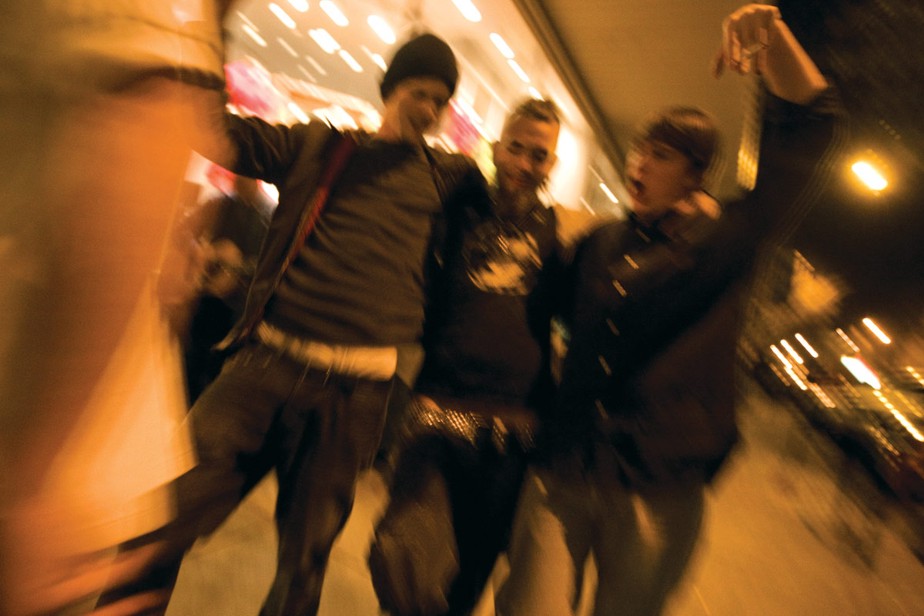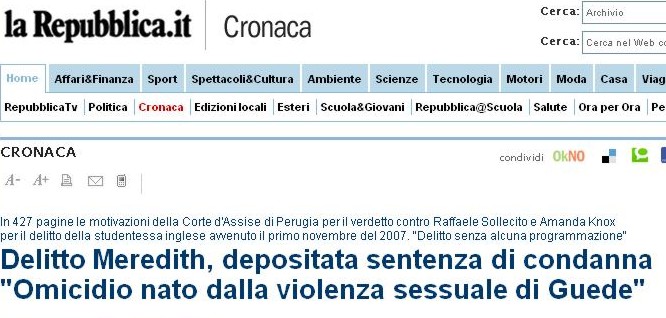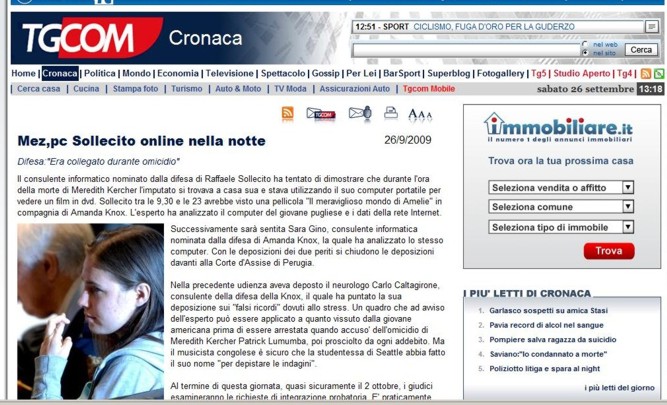
Category: Italian context
Saturday, March 05, 2011
Thoughts On Meredith’s Tragic Case And Its Significance In The Bigger Scheme Of Things
Posted by Saskia van der Elst
As one of the regular commentators on this forum once pointed out, the question we all are trying to answer regarding the pointless murder of the talented and beautiful Meredith Kercher in Perugia is: What is it, that keeps on drawing us to this case?
We all have our own reasons. According to me, a murder case seldom has so much in common with an old school murder mystery, or “whodunnit”. A victim that you instantly sympathize with, several suspects, each with their own particular background, ethnic origin and possible motives, a tragic event taking place on the day of the Death, a charismatic prosecutor, who himself is the center of some controversy, and all of this set in the stunningly beautiful medieval hilltop town of Perugia, with its two universities, its relatively small population and its many temporary residents, studying and partying in the small town center.
All are ingredients for a captivating story: a small universe, that can easily be explained to an outsider and once you heard the beginning of the story, you crave more. More information, more depth, more color. For those that have a normal, healthy brain, there comes a point in any murder mystery where you are convinced of the guilt of one or more of the characters in the story and as you near the end of the story, there might be an unexpected twist, but you can rest assured that you will find out who did it.
Of course, in real life stories don’t follow formulas, most of the time they don’t have a definitive ending and in the case of the murder of Meredith, the book is not closed. The three perpetrators of the crime have been convicted to a total of 67 years in jail between the three of them, but all three maintain their innocence. We all know that three cannot keep a secret, so it is a matter of time until one of them reveals more about the exact events that took place on the 2nd of November in 2007.
Each of the three perpetrators will go through a process of maturing in prison. Once they feel they have paid a significant price for their crime, they may realize the graveness of they crime and realize that they made bad decisions in their past. Not until that moment, they can find redemption and may feel the need to let the world know that they have changed as a person. All three perpetrators were immature in their own way when they committed their crime, so it might take a while for them to mature enough to be able to face reality.
Rudy might be the first one to reach that point, since he is more or less an orphan, with no controlling relatives, friends and others with vested interests in the lies that have masked the truth. Nobody will lose face if he decides to confess his participation in the crime. The same thing, but to a lesser degree, is true for Raffaele. Since he never even cared about clarifying all inconsistencies in his stories, he implicitly has already admitted his involvement. He too, doesn’t affect many people if he opens up and gets clean. The only close relatives he has are his father and sister and they have not publicly expressed a strong believe in his innocence.
Amanda is in a much more difficult position, because of the amount of people that was mobilized to defend her. By now she has been the income generator for quite some people and although nobody envies her parents, they have a clear mission, that keeps them occupied and that gives their lives meaning. The moment Amanda would confess her involvement, the parents would be forced to exchange the “free my innocent daughter” banner for one that reads “I raised a murderess that is serving two and a half decades in a foreign prison”.
On top of the above, the process of coming clean might be a slow one, because all three suffer from uncertainty about how the other two are doing. That uncertainty might cause postponing the advance, until they are forced to speak up, because one of the others did so first.
The result for those that are following the case is that we know we don’t have all information yet and for us to fill in all the blanks and be able to understand what exactly has happened to Meredith we need that information. Until we have it, we cannot accept the story as is as it leaves us unsatisfied. Of course we are talking about a true story here and not about a work of fiction, but for the rational part of our minds that doesn’t make a difference.
Friday, November 12, 2010
Report Students Studying Abroad on Average Double Or Triple Their Alcoholic Intake
Posted by Peter Quennell
American embassies and other nations’ embassies abroad get to hear of hundreds of cases a year of students who got in over their heads.
In the past couple of years, there have been TWO notorious murders by foreign students in Florence alone. Florence is about one hour’s drive north of Perugia. The embassy simply shrugged and moved on as Italian justice worked its careful process through.
Both perps happened to be American, and both were high. There were no cries in those cases of anti-Americanism. Howvever, there was some troubled talk in Italy of the excesses foreign students go to.
And a lot of tightening up by the colleges who send a lot of students abroad, including the University of Washington (Amanda Knox’s college) and Pepperdine University (Steve Moore’s former college - this helped to seal his firing.)
Amanda Knox is one of the rare ones who shrugged off all home-college supervision, presumably with the okay of her parents. Meredith was closely watched over by the Erasmus scheme, which sadly did not save her life.
Now the University of Southern California’s student newspaper carries this report on one root cause of students facing foreign judges.
Students traveling abroad can keep glass half full
By Kelsey Clark of the Daily Trojan
According to researchers at the University of Washington, American college students who study abroad are likely to increase “” even triple “” their alcohol consumption while traveling internationally.
Students over the age of 21 doubled their intake of alcohol from an average of four drinks per week on campus to eight drinks per week abroad, according to a study published in the October issue of Psychology of Addictive Behaviors. The overall increase in surveyed students’ alcohol consumption was 105 percent, while those underage students tripled their drinking with an increased consumption of 170 percent….
By consuming alcohol in excess, particularly in an unfamiliar country, the risks for students are greater than those traditionally associated with a night of drinking at USC.
Though instances of injury, crime and sexual abuse do occur as a result of binge drinking at USC, such severe ramifications are comparatively rare within the university’s party culture. Some of the more prevalent woes are students who slept through class because of a hangover or ruined a cell phone by jumping in a pool.
But students who travel abroad must take additional precautions as the heightened risks include becoming lost, getting pick-pocketed or otherwise taken advantage of.
And of course bumping some poor innocent person off.
Monday, November 08, 2010
Another In Seeming Never-Ending Disasters For Hapless Knox Campaign
Posted by Peter Quennell

Apparently xenophobia and sliming and serial misconstruing of the evidence isnt working. The Italian authorities continue to be relentless and unblinking.
In court today, Amanda Knox was indicted by the judge and she WILL stand full trial next May for calunnia. This first report on the BBC News website as follows.
American student Amanda Knox is to face trial for slander after saying police beat her during questioning over the killing of Briton Meredith Kercher.
A judge made the decision at a closed indictment hearing in Perugia, Italy.
Knox, 23, told the judge she never intended slander and was just trying to defend herself, her lawyer said.
Ann Wise of ABC News adds this.
American student Amanda Knox was indicted for a second time by an Italian court today, this time for allegedly slandering Italian police for saying they were abusive when they interrogated her for the murder of her roommate.
Knox, who was convicted last year of murdering Meredith Kercher and sentenced to 26 years in prison, stood up in court and made what Italian legal officials call a “spontaneous statement” before the judge’s ruling.
“I have always tried to defend myself. I never wanted to offend or slander anyone,” Knox said in Italian.
Nevertheless, preliminary hearing Judge Claudia Matteini indicted Knox, 23, for slander.
The charge refers to Knox’s testimony during her murder trial that Italian police were rough with her when they interrogated her overnight just days after Kercher’s body was found in a pool of blood in the house they shared.
She claimed the officers yelled at her, discouraged her from calling a lawyer and cuffed the back of her head. The 12 officers named in the slander complaint have denied being abusive to Knox.
At the end of the long interrogation, Knox signed a statement in which she said she had a confused dream-like recollection of being in the house and hearing Kercher scream, effectively placing her on the scene of the crime.
Knox’s lawyer Carlo Dalla Vedova said Knox was “saddened” by the decision.
Another lawyer for Knox, Maria Del Grosso, told reporters that “for Amanda this (interrogation) was the genesis for her homicide accusation. She is very frustrated and obviously disappointed, but she knows that today’s was only a preliminary hearing and the truth was not ascertained today. Let’s hope it is when the case is debated because there was something that went wrong that night.”
Knox was driven into the courthouse in a police van with darkened windows. The hearing was closed to the public, but photographers were able to get a glimpse of her in the courtroom hallways. Looking thinner and drawn, Knox wore a dark green sweater and black pants, her hair is a jaw-length bob.
Before the hearing, Knox’s stepfather Chris Mellas told ABC News that “Amanda is doing better. She is rightfully angry about the slander accusations, and told me she was going to speak out in court this morning. She told me she wanted to tell them that she sees police interrogations shown on TV all the time, and would like to know why her interrogation was not recorded or videotaped.”
But according to her lawyers, she limited her statement to saying she was just defending herself and did not want to offend.
Knox will go to trial for slander on May 17, 2011 before a single judge, Cecilia Bellucci. Matteini said the case needed to go to trial to resolve some formal technical matters, and to debate the accusations, possibly with witnesses.
The lawyer for eight of the police officers, Francesco Maresca, said that the “framework of the request for an indictment was confirmed, and now we await the debate.”
Conviction of the charge could add as much as six years to Knox’s prison sentence.
Again, this is the nexus of Amanda Knox’s accusation against poor Patrick Lumumba who spent two terrifying weeks in Capanne Prison and later lost his business when the customers fled.
Whatever else she may be, Knox does seem to be a serial blamer of others. Blaming the cops for her blaming Patrick, Knox seemed to us to think, was an easy way out.
Italian reports say that she seemed to be scowling or sour or very serious or depressed (no mention of nervousness) and that she had put on a few pounds.
Sunday, October 31, 2010
Corruption Of Appeal: Angry Top Criminal Judge Chiari Is Blatantly Forced Aside
Posted by Peter Quennell

Umbria’s top criminal judge Sergio Matteini Chiari
Very Dirty Business
Only one month ago Umbria’s top criminal judge Sergio Matteini Chiari was to preside.
Now a very angry Judge Chiari has been forced aside with no public explanation from Chief Judge De Nunzio [image below] as to why.
A wildly wrongly qualified judge, Hellmann, a business judge with just two criminal trials in his past, both fiascos, mysteriously takes his place.
Rumors of foul play are appearing in the Italian media. Has Chief Judge De Nunzio been leaned upon politically? Do big bucks or rogue masons have any role in this?
Please click here for more
Friday, March 19, 2010
Rome Panel On Meredith’s Case: Seems To Have Been Shallow, But Of No Comfort To Knox Apologists
Posted by Cesare Beccaria
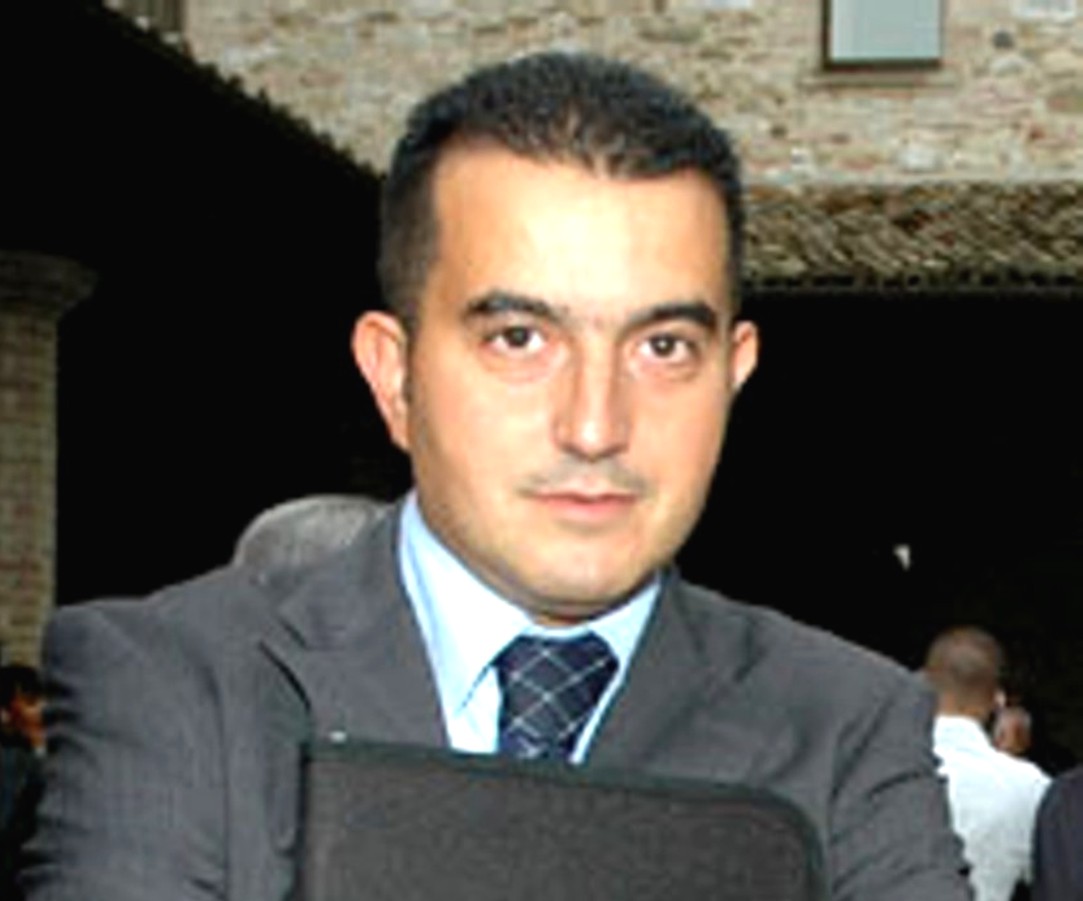
[Above: IAF president Rocco Girlanda - a wannabe Italian David Marriott?]
The outrage that directly led to the creation of TJMK late in 2008 was the deliberate attempt to disappear Meredith and to replace her as the “real victim”.
Reversing that horrible trend and ensuring Meredith is revered, and at the end of the day granted her true justice, has always been our main mission. We have also worked to reverse the horrible sliming of Italy (a country Meredith loved and so looked forward to) and the officials and the trial process.
As far as we can see no English-language media have better explained the impressive Micheli Report and the impressive Italian system and the powerful evidence of guilt. Or for that matter lately shown Italy in such a positive light.
Ideally, if it had wanted to spread actual understanding, the Italian American Foundation Rome panel yesterday should have covered much of that same ground.
As far was we can see, it didn’t. And there seems to have been little mention of Meredith.
But at least the panelists seem to have come up with no new criticisms. Today Italy looks no worse, and Knox’s position looks no better. And the panel was inconclusive on what might have happened differently in the United States. (We reckon the outcome would have been identical but the sentences would have been Life.)
Andrea Vogt reports for the Seattle P-I on yesterday’s doings. Key excerpts below.
1) On the Italian American Foundation panel
The gathering was not so much an exercise in legal theorizing as one to smooth the hard feelings between Italy and the United States over the trial of one American college student. It’s a case that has spawned books, Websites and congressional involvement.
In fact, experts decided they couldn’t say what would have happened in an American trial.
“The only answer is, it is impossible to answer this question,” lawyer Anthony Sistilli told the audience, according to ANSA Italian wire services that covered the forum. “We do not want to retry the case. We want to help bridge the gap of understanding, which is our mission for this meeting.”...
“Trial outcomes are unpredictable. You really can’t guess what the outcome would be,” Arcabascio, who is co-director of the Florida Innocence Project, told the crowd. “But reasonable doubt is a standard of proof we use in both countries.”
Arcabascio also noted that sequestered juries are still used in the United States, but less and less common due to the high cost….
“No-one had any intention of bringing up criticisms,” said Rocco Girlanda, president of the U.S.-Italy Foundation told seattlepi.com. “Our scope was simply to compare the judicial systems and trial processes of Italy and the U.S.”
2) On Amanda Knox in prison
Girlanda ended the evening on a light note, saying that perhaps after the case’s expected appeal, the association would even have the chance to have a “special honored guest,” meaning Knox.
He also mentioned that the association is continuing to meet regularly with Knox in prison. Italy-USA Association officials said that prison authorities have called Knox’s behavior in Capanne “exemplary.”
Though she had requested work in the prison laundry, she has been given a less menial task with the prison commissary. Her job, according to foundation officials who meet with her, is to take orders from the various cellmates about what they want from the prison store. Inmates are able to buy items such as candy, cheese, soda or other small shopping items.
There are also some must-read paragraphs by Andrea Vogt on the very fishy commercial aspects of IAF president Rocco Girlanda’s role in the case. Is he seeking a PR contract?
Rocco Girlanda, who is also a parliamentarian and PR consultant, has been criticized before for raising false hopes for Knox apologists, and yesterday he did it again.
Andrea Vogt also reports on the state of Seattle-Perugia relations (with links to some Facebook pages), on the new books on the case, and on a new pro-Sollecito website, apparently created by a certain Chris Mellas.
What a surprise.
Low-traffic low-traction and generally highly inaccurate apologist websites, all with a nasty sneering tone, seem to be springing up like wildflowers these days.
************
Below: IAF president Rocco Girlanda at right with fellow parliamentarians outside Capanne Prison, after visiting Amanda Knox.
Thursday, March 04, 2010
Sentencing Report: La Repubblica Has The Most Substantive Report So Far Today
Posted by ziaK
Click above for the Repubblica’s story in the original Italian.
This translation below is of this the longest report so far today in the Italian media, presumably by staff reporters in Perugia, although it is unsigned.
Verdict filed in Meredith crime: Murder arising from Guede’s sexual violence
PERUGIA - Four hundred and twenty-seven: This is how many pages it took for the judges of Perugia’s Court of Assizes to explain the sentence on the murder of Meredith Kercher in Perugia on 1 November 2007. For this crime carried out, the judges wrote, “without any planning, without any animosity or feeling of rancour”, Amanda Knox and Raffaele Sollecito were sentenced to 26 and 25 years imprisonment, respectively. For the same crime, Ivory Coast national Rudy Guede was sentenced (to 30 years following a “fast-track” trial, subsequently reduced to 16 years in appeal) and is currently waiting to file an appeal with the Supreme Court. The Perugian judges wrote: “The motive, was of an erotic, sexually violent nature, which riginated in the evil choice made by Rudy, and elicited the active collaboration of Amanda and Raffaele.”
From Viterbo prison, where he is held, Rudy wrote a letter with an appeal: “to those who know, talk”. A request which appears to be addressed to the same Amanda and Raffaele (both - particularly the American student whom he has always claimedto know - pointed to by Rudy as having been present at the crime scent, ndr) who have always declared themselves to have no involvement in the affair.
Together, all the elements which emerged during the process “demonstrated a comprehensive and unified picture, without gaps and inconsistencies”, wrote the judges in the file signed by the Court President, Giancarlo Massei and by assessor judge Beatrice Cristiani. According to the College [as in the board of judges], the picture that emerges “has, as its necessary and strictly consequential outcome, the attribution of the hypothesized facts of the crime to both the accused.”
The measure furthermore asserts that Knox “freely accused Patrick Diya Lumumba of having killed Meredith, and so accused him with the full knowledge of the innocence of the same Lumumba”. The judges underlined that there had not been “any confirmation” that Amanda had been urged by the investigators to accuse Lumumba. For Perugia’s Court of Assizes, the objective aimed at by the American (who was also convicted for the crime of calumny with regard to the Congolese [sic] musician, ndr) was to “lead the investigators down the wrong path, far from that which could have led them to establish her own responsibility, and that of her boyfriend”. “Such behaviour is a choice”, wrote the Court, “and thus merely defensive: Amanda had a good relationship with Lumumba, by whom she had always been well treated, and therefore there could have been no motive for rancour, animosity, revenge which could have justified such a serious accusation.”
The murder of Meredith Kercher, it further reads, was carried out “without any planning, without the animosity or feeling of resentment towards the victim which in some ways can be seen as the preparation/predisposition to commiting a crime”. According to the board of judges, “the actions turn out to have been carried out as a result of purely coincidental events”.
In the judges’ report, they talk of “purely coincidental events which, when joined together with each other, created a situation which, in the combination of various factors, made possible these crimes to the detriment of Meredith: Amanda and Raffaele who suddenly found themselves without any commitments, meet Rudy Guede by chance (there is no trace of any appointment having been made), and find themselves together at the house on the via della Pergola on the very evening (between 1 and 2 November, ndr) that Meredith is there alone”. According to the judges, “even the behaviour towards Meredith - once the assault and the murder have been commited - which consisted in covering her lifeless body, shows a feeling of pity for the victim, refusal, and thus a sort of repentance for what has been done: refusal and repentance shown through such an act of pity.”
The judges attributed the material criminal act, that is, the sexual violence, to Rudy Guede, who was aided by Amanda and Raffaele, weakened by the drugs they had consumed. The judges wrote: “Amanda and Raffaele participated actively in the criminal actions carried out by Rudy with the aim of overcoming Meredith’s resistance, subjugating her will, and allowing Rudy to relieve his lustful urges.” The judges also wrote in their report: “The prospective of helping Rudy achieve his aim of subjugating Meredith in order to sexually abuse her may have appeared to be an exciting detail which, although unforeseen, should be tried”.
“The motive”, added the Perugian judges, “was therefore of an erotic, sexually violent nature, which originated in the evil choice made by Rudy, and elicited the active collaboration of Amanda and Raffaele. That such participation, active and violent, had also involved the current defendants as well as Rudy can be deduced from what has been observed in talking about the lesions suffered by Meredith, by the outcome of the genetic investigations, by the prints of bare feet found in various parts of the house.”
According to the judges, in this murder case, one of the tests, carried out by several people, is confirmed by Meredith’s physical strength, by the fact that she was conscious on the evening of the assault, and by her previous experience in the gym. “Meredith, when the violence began, was awake and dressed, and was not laying down on her bed.” Furthermore: “According to the analyses, the young woman had a slender and well-endowed physique, and was physically very strong, as was claimed by Meredith’s mother and sister. She had even done boxing”.
Tuesday, December 08, 2009
Most Important Italian Paper Balks At The Attempts In US At Intimidation
Posted by Commissario Montalbano
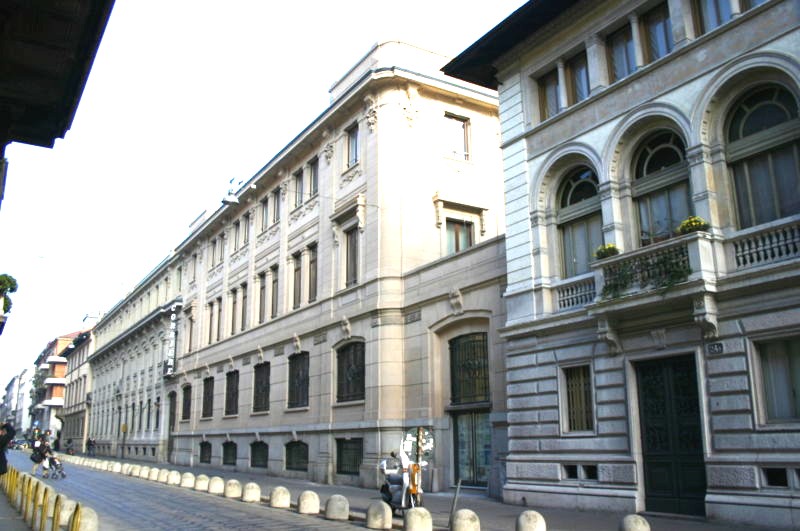
[Above: The Corriere Della Sera building in Milan]
The Corriere Della Sera is the Italian equivalent of the New York Times and the London Times.
It wields huge influence throughout Italy and reflects the popular mood in its reporting. It does NOT like the campaign of vilification against the trial and its outcome. Here is a translation of today’s blast by Beppe Severgnini.
The do-it-yourself verdicts and that wrongful U.S.A. cheering
Many Americans criticize the ruling, but have never followed the case. Why do they do that?
Judicial nationalism and media justice, when put together, form a deadly cocktail. We also have Reader-patriots and journalist-judges ourselves, but what is happening in the United States after the conviction of Amanda Knox, is embarrassing. Therefore it is highly worth pondered upon.
American television, newspapers and websites are convinced that Amanda is innocent. Why? No one knows. Did they follow all of the trial? Did they evaluate the evidence? Did they hear the witnesses who, moreover, testified in Italian? Of course not! They just decided so: and that’s enough.
Like Lombroso’s*** proselytes: a girl that is so pretty, and what’s more, American, cannot possibly be guilty. No wonder Hillary Clinton is now interested in the case: she’s a politician, and cannot ignore the national mood.
There are, as I wrote at the beginning, two aspects of the issue. One is judicial nationalism, which is triggered when “a passport is more significant than an alibi” as noted in yesterday’s Corriere’s editorial by Guido Olimpio. The United States tend to always defend its citizens (Cermis tragedy, the killing of Calipari) and shows distrust of any foreign jurisdiction (hence the failure to ratify the International Criminal Court). In the case of Italy, at play are also the long almost biblical timespans of our justice, for which we’ve been repeatedly criticized at the European level.
But there is a second aspect, just as serious as the first: the media justice operation. Or better: a passion for the do-it-yourself trial. It’s not just in the United States that it happens, but these days it is precisely there that we must look, if we want to understand its methods and its consequences.
Timothy Egan - a New York Times columnist, based in Seattle, therefore from the same city of Amanda - writes that the ruling “has little to do with the evidence and a lot with the ancient Italian custom of saving face.” And then: “The verdict should have nothing to do with medieval superstitions, projections sexual fantasies, satanic fantasies or the honor of prosecuting magistrates. If you only apply the standard of law, the verdict would be obvious “.
But obvious to whom? Egan ““ I’ll give it to him - knows the case. But he seems determined, like many fellow citizens, to find supporting evidence for a ruling that, in his head, has already been issued: Amanda is innocent. In June - the process was half-way - he had already written “An innocent abroad” (a title borrowed from Mark Twain, who perhaps would not have approved this use).
To be sure, among the 460 reader comments, many are full of reasonable doubt and dislike journalists who start from the conclusion and then try in every way to prove it.
I did not know if Amanda Knox was guilty. In fact, I did not know until Saturday, December 5, when a jury convicted her. I do have the habit of respecting court judgments, and then it does not take a law degree ““ which I happen to have, unlike Mr. Egan - to know how a Court of Assizes works.
It is inconceivable that the jurors in Perugia have decided to condemn a girl if they had any reasonable doubt. We accept the verdict, the American media does not. But turning a sentence into an opportunity to unleash dramatic nationalistic cheering and prejudice is not a good service to the cause of truth or to the understanding between peoples.
A public lynching, a witch hunt trial? I repeat: what do our American friends know? How much information do those who condemn Italy on the internet possess? How much have those who wrote to our Embassy in Washington, who accused the magistrates in Perugia, and who are ready to swear on Amanda’s innocence, studied this case for past two years?
Have they studied the evidence, assessed the experts’ testimony, or heard the witnesses of a trial that was much (too) long? No, I suppose. Why judge the judges, then?
They resent preventive detention? We don’t like it either, especially when prolonged (Amanda and Raffaele have spent two years in prison before the sentence). But it is part of our system: in special cases, the defendant must await trial while in jail.
What should we say, then, about the death penalty in America? We do not agree with it, but we accept that in the U.S. it is the law, supported by the majority of citizens. A criminal, no matter which passport he has in his pocket, if he commits a murder in Texas, knows what he risks.
Before closing, a final, obligatory point: I also did not like the anti-Amanda crusade in the British media, for the same reasons. The nationality of Meredith, the victim, does not justify such an attitude.
For once - can I say it? - We Italians have behaved the best. We waited for and now we respect the ruling, pending further appeal.
I wish we Italians behaved like that with all other high profile crimes in our country - from Garlasco’s case and on - instead of staging trials on television and spewing verdicts from our couch.
***Note: Cesare Lombroso, was a 19th century Italian criminologist who postulated that criminality was inherited, and that someone “born criminal”’ could be identified by physical defects.
[Below: the distinguished Italian columnist Beppe Severgnini of Corriere]
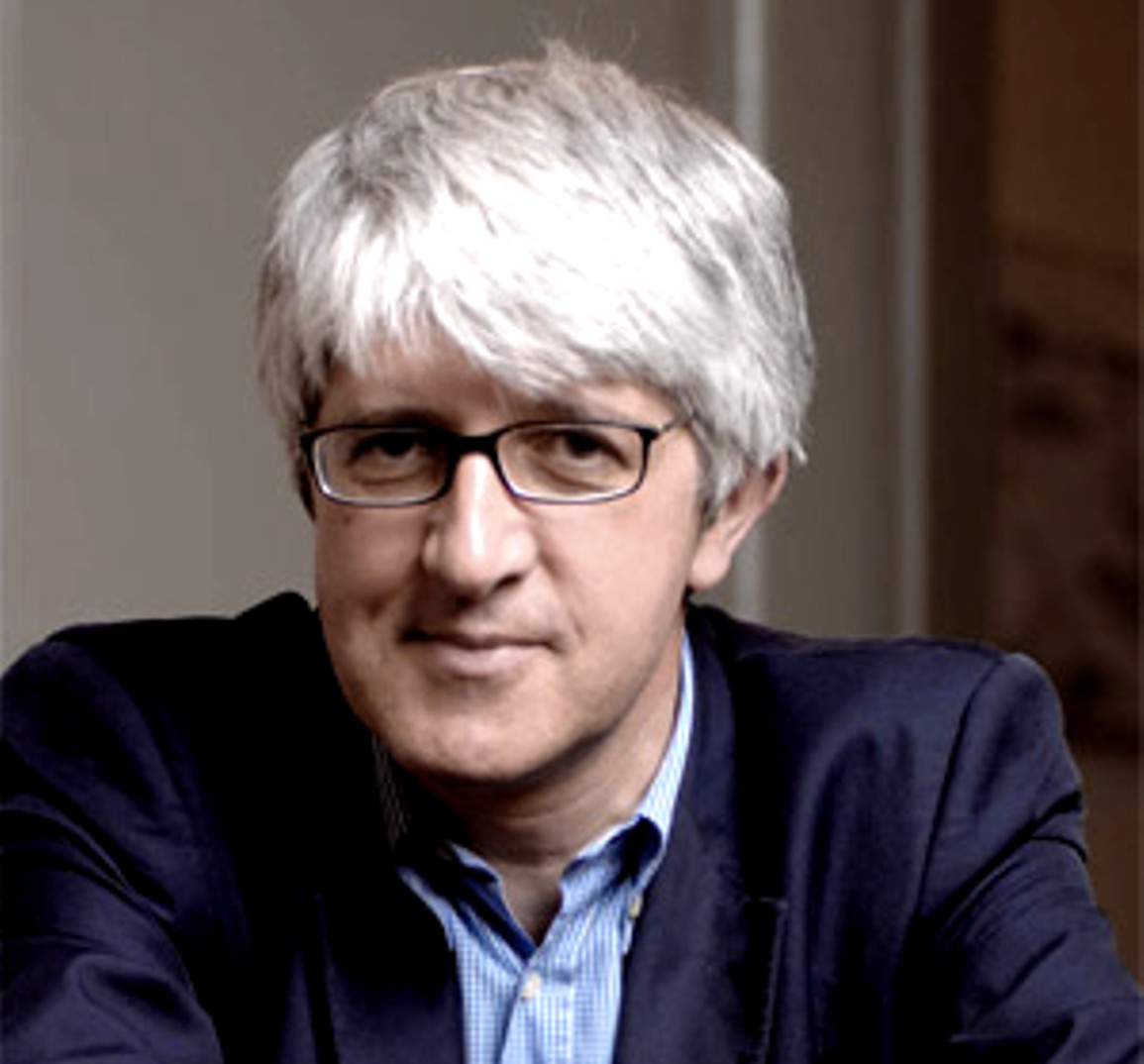
Saturday, September 26, 2009
Trial: Italian-Language Reporting Faster, More Objective Than Worsening Average English-Language
Posted by Peter Quennell
It is no secret that the English-language reporting increasingly seems all over the map these days.
This is being much-discussed behind the scenes, and informed commenters like MacK MacK are being quite open about it. Some English-language reporters seem too anxious to keep on the good side of the FOA while they seem to have no pipeline at all to Meredith’s family, or her friends, or her supporters.
Meanwhile, all of the major TV networks in New York are concluding that the FOA line is basically non-credible and history as far as they are concerned - and that the REAL emerging story is to be Meredith.
We think they have the much smarter take here. A lot more attention needs to be given to Meredith now, and a lot less attention to the highly over-exposed mantras of the FOA.
None of the English-language reporting on the trial today is out yet. But here is some of today’s Italian-language reporting - straight reporting without spin:
1) From TGCOM
The computer consultant appointed by the defense of Sollecito has tried to show that during the time of the death of Meredith Kercher the accused was at his house and was using his laptop to watch a movie on DVD.
Between 9.30 and 11:00 he would have seen a film “The Wonderful World of Amelie” in the company of Amanda Knox. The expert analyzed the computer and the internet data of the young Pugliese.
Next will be heard a computer consultant appointed by the defense of Amanda Knox, who has analyzed the same computer. With the testimony of these two experts, the defense depositions before the Court of Assizes of Perugia draw to a close..
TGCOM then includes several objective, low-key paragraphs on yesterday’s testimony about why Knox was freaking out at the police station.
She was freaking out but not we think for the bizarre reason the expert provided.
Proving that Raffaele Sollecito at the time of the death of Merdith Kercher was in his house and was using his laptop to watch a movie on DVD was the purpose of the technical analysis of a computer consultant for the defense, a Mr Giovinazzo. He was asked to give evidence today in court for the trial over the death of Meredith Kercher that occurred on November 1, 2007 in the house on Via della Pergola.
He claimed that Sollecito between 9.30 and 11 would have watched a film, “The Wonderful World of Amelie” in the company of Amanda Knox. This has been claimed for almost two years by the defense of the boy from Puglia.
Here is the Machine’s meticulous description of the prosecution’s take on Sollecito’s alibis which directly contradicts this.
Tuesday, August 11, 2009
Americans Pretending To Be Italians?!
Posted by Peter Quennell
What this blogger encountered, among other things, in an obviously very happy few days in Rome.
We’ve heard that one before, by the way. Quite often. Visiting foreigners envying the Italians for their looks, their fire, and (now and then!) their real class.
And they can be so funny. And so caring.
Images here are of some of the amazing fountains of Rome.
Saturday, August 08, 2009
Before Mozart, Beethoven, And Bach… That Amazing Italian, Scarlatti
Posted by Our Main Posters


